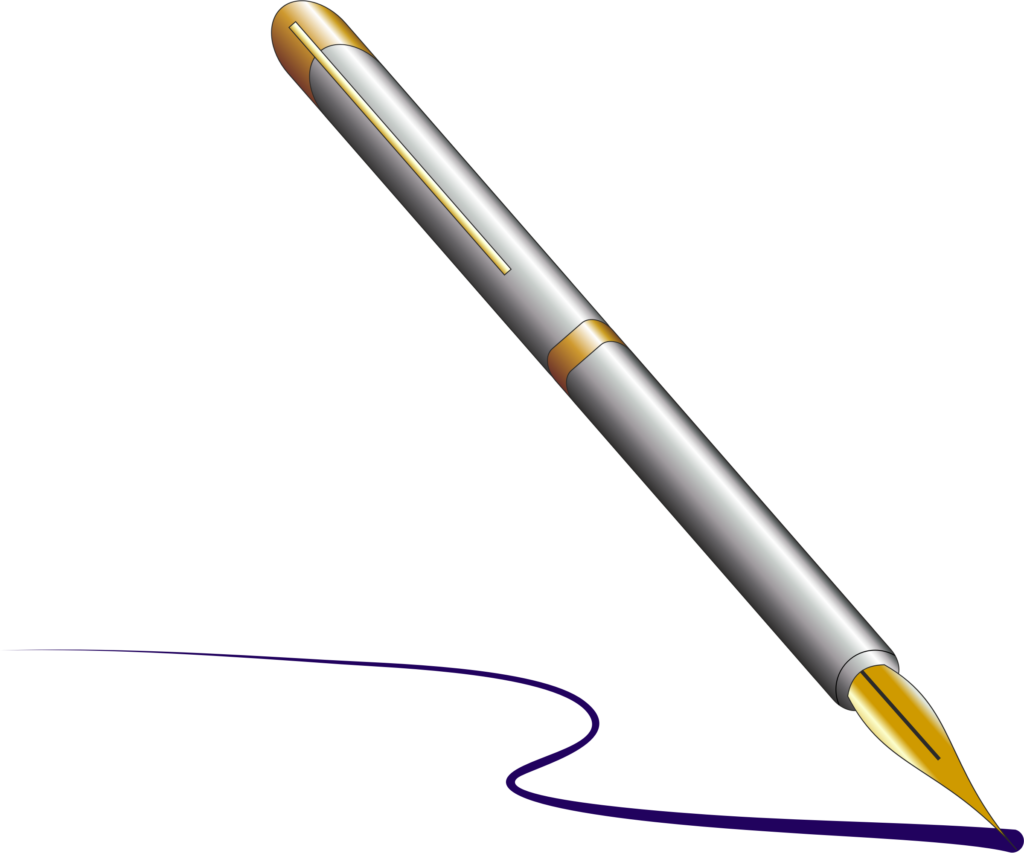On The Origins of My Notebook
I don’t get asked nearly as often as I want.
Sure, people ask me about my notebooks all the time. They ask me about my handwriting. They comment on how neat and organized my notebooks are.
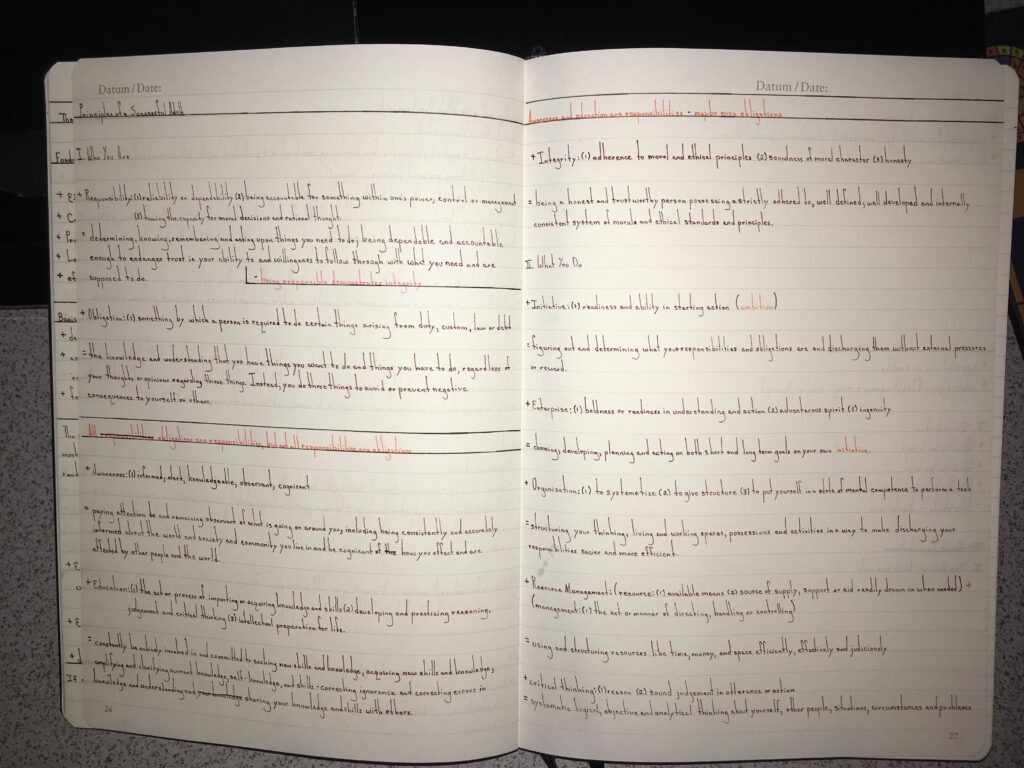
They even comment on how organized my thoughts must be. (If they only knew the chaos in my brain.) Sometimes – not nearly as often as I want – they ask what I use my notebooks for.
But it is very rare for people to ask me about the origins of my notebook – my most prevalent habit.
I suppose notebooks – even the nicer ones – are a ubiquitous feature of life. Before smartphones and PDAs and tablets, there were notebooks, post-its, pads of paper and other ways to write things down. Cleaning out my mother’s and grandmother’s and great-grandmother’s things revealed all manner of long forgotten notes about this, that or the other.
My notebooks are such an innate and important facet of my life I am surprised the people who know me best haven’t wondered where my notebooks started. Why I keep using notebooks instead of switching to something digital.
(It’s not like I don’t love technology. Or digital tools.)
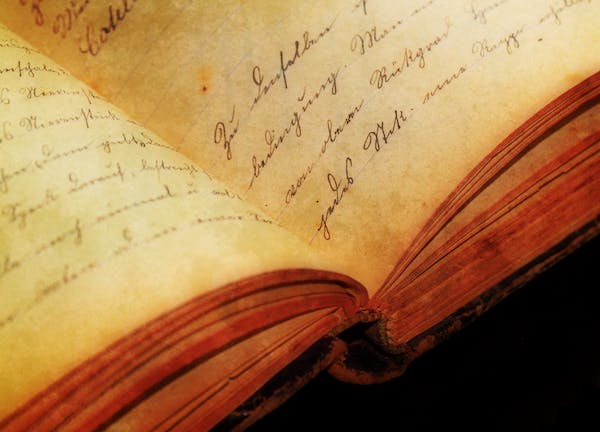
There is a reason – and a story behind it. I realized it while talking about elementary school, because that’s when it started. Poor and groping for meaning, my awful handwriting etched into the wide-ruled pages of spirals that dug into my wrist (being left-handed can be a literal pain) in giant letters that swam around the lines and never quite managed to space out the way they should.
My public school experience was ten different kinds of nightmarish, and I’m sure if were to get to talk to some of my old teachers now, they would despair of my having ever made something of myself. I’m also sure that by many accounts, I haven’t made enough of myself. Working a job that barely pays the bills – no college degree, and no accomplishments of the kind you can frame and put on a wall for everyone to look at critically when they come into your office.
I’m also sure what’s in my notebooks tells a very different story of my life. A story of pain – chronic illness, fatigue – of loss as people around me passed away, and as friends and social groups drifted away or broke apart. A story of me in a half dozen different careers and endeavors, all framed by the simple concept of wanting to be someone who helps other people.
I want to be someone who makes life better for other people. Who speaks up for the people no one is listening to, and who can help others chart and easier, clearer and less painful path than I walked.
My notebooks are full of stories. The story of a single day, told in check marks and to do lists – many of which were probably undone. Of notes about students or people I talked to and worked with. Notes about things I had to reschedule or add at the last minute.
They are full of ideas for things I want to write and haven’t. Ideas for things I wanted to write and did.
They are full of concepts. Quotes. Moments. Things I might should have posted to social media, but didn’t. Things I wanted to do and didn’t. Things I wanted to do and did.
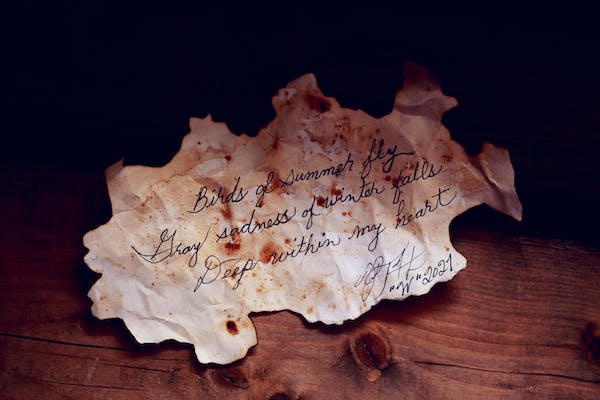
Of course, the notebooks didn’t start there. They started with the simple notion I was supposed to write down the things people told me. Not just anything and not just anyone; I was supposed to write down the important things said by the important people.
In school, students are always told to find mentors, but that is an arcane and confusing – and often times intimidating process. I’ve been lucky in that I have had a lot of amazing mentors. People willing to share knowledge and experience and skills with me. (Most of which I have written down.)
The start of my notebooks also how I learned to find mentors.
My third grade teacher – Miss Wallace – was an amazing woman who reshaped my entire world by figuring out I had learning disabilities and helping me learn ways to deal with them. Taught me that I had to understand my own mind and my own emotions and my own reactions in order to discipline myself enough to succeed at anything. Of course, I had no idea that’s what she was doing. All I knew is that I had a teacher who liked me and cared about how hard things were for me.
It was in her class I learned about notebooks. She (and the teacher from next door who always came by and talked to us), told us that we needed to find people we admired, who did things we admired, and ask them to tell us one thing they though we should know. It was also the first time I learned how important questions are, but I wouldn’t realize that until a lot later, either.
We were supposed to have one notebook, one place, where we were supposed to write down those things. I had that notebook for a long time, until it was destroyed by a bully in middle school. I had notebooks after that, too. Notebooks I wrote stories in, bought from a vending machine for $0.75 (three quarters) that sat outside the school office, or more rarely from the sporadically open school store. (I love the concept of a school store, and it’s one I hope is still around in some form or another. It made me happy to buy things there, especially school supplies. And I don’t think I realized that until just now.)
I was never able to really ever replace that notebook or any of the other notebooks people took from me and destroyed. Or that teachers confiscated and never gave back. I often lament the knowledge and thoughts that were in those notebooks and are lost of me. I wonder about the notebooks teachers took and never gave back. Did the teachers ever read them? Did they ever think about what they were actually taking from me?
Did they care? Or was I just that annoying kid who didn’t fit in who desperately wanted approval and support and something that looked like or felt like acceptance, even if it was just for a brief second?
I know I annoyed them. I know they got tired of listening to me. Tired of the problems I had. Tired of the issues I brought into their otherwise easy classrooms.
But there it is.
As I kept using my notebooks, they evolved. I would write down study tips. Information I didn’t want to forget. The things people told me when I asked them to tell me their one important thing. Or, when they taught me more and became a mentor, all of the many, many things they told me. I started keeping lists of things I wanted to do. Things I wanted to write. Things I wanted to look up and explore.
Before I knew it, I had sections in my notebook for assignments, chores, appointments. I kept longer lists in one part of the notebook – my comprehensive to do list, lists of things I wanted to save for, research, not forget, quotes, etc. And I kept daily and weekly lists in other parts of my notebook.
When I saw other notebook or planner systems, I shamelessly stole ideas from them, including the now-famous Bullet Journal methodology. Even as it evolved, I taught it to others – sometimes students, sometimes friends, sometimes just co workers who wanted to be more organized – and they, in turn, used it or not as they saw fit. But it has always been my most powerful and prevalent tool.
Writing things down. A lot of the time, the pen and paper aspect is just a matter of speed. My phone or my tablet are not always convenient (or fast) places to write things down, but I always have pen and paper on me. (Because I’m a writer. It happens.)
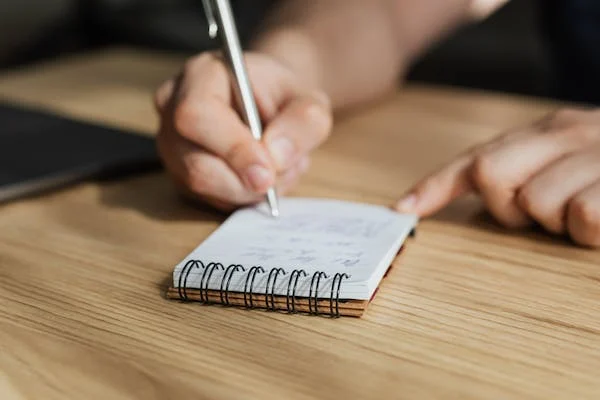
I can make a shorthand note in my pocket notebook faster than I can turn on my phone, pull up an app, and tap keys or whisper dictation. Some of it is the tactile feel of pen and paper, and the enforced memory cuing that writing it down creates – making my brain hold the thought, slow down to form the letters and the words, and choose what information to write down and what to just let stay in my brain. to add my own thoughts and reactions to it.
That process is a huge part of my success in remembering what I need to do and when I need to do it. And part of my secret for how much I have so much information in my brain.
Some of it is habit, and changing a habit that started so early in my life and replacing it with a digital habit is going to take time and energy. My shorthand would have to change. The symbols I use regularly aren’t on the normal keyboards. The notations I use are often things any decent app will tell me are misspellings and autocorrect to something that makes no sense to me – in or out of context.
It’s a form of magic I don’t want to let go of. (To say nothing of it not requiring a charger, even if it does require a light.) -Alan Rogers
And some of it is that I just like writing things by hand. I get a lot of satisfaction out of a well written word, or seeing ink appear on paper. It’s a form of magic I don’t want to let go of. (To say nothing of it not requiring a charger, even if it does require a light.)
I know I have to evolve. Eventually, the arthritis won’t let me write by hand the same way I do now. Eventually, my eyes will need fonts and screens more than pen and paper. And eventually, I will be mostly, if not all, digital. But I’m taking my time and learning how to do it, using apps and programs that hopefully won’t disappear in a year or five. Because my notebooks are an archive of my life – my stories and my creations – and I want what I create digitally to endure the same way and be archived and accessible and remembered just the same as my notebooks will be.
